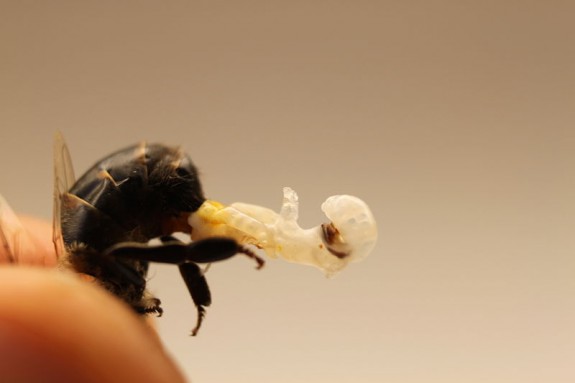This New Sperm Bank for Honey Bees Could Help Fight Colony Collapse Disorder
By boosting bees’ genetic diversity, this sperm bank could make American bees stronger

A drone bee’s penis. Photo: Michael L. Smith
It’s no secret that honey bees aren’t doing so well. Colony Collapse Disorder causes hives to empty over the winter as bees get lost out in the field. The supposed causes of CCD are varied, with everything from high fructose corn syrup to mites to pesticides to disease being put forward as an explanation for the (potentially recurring) disorder. But while we don’t know exactly what’s behind the disappearing bees, researchers at Washington State University have an idea of how to fix it: frozen bee semen, and lots of it.
One of the underlying drivers of bees’ susceptibility to all the proposed environmental and human-caused factors behind colony collapse disorder may be the bees’ limited genetic diversity. You see, in 1922, English bee keepers were battling tracheal mites. To stop the mites’ spread to the U.S., the importation of foreign bees was banned says Washington State. Subsequent disorders and diseases attacking bees further reduced their numbers, and over time the species genetic diversity dwindled. Having reduced genetic diversity within a population means that individuals are more genetically similar to one another, meaning that the population as a whole is less resilient to new diseases or other pressures.
To try to boost honey bees’ genetic diversity, researchers at Washington State are starting a sperm bank for busy bees from around the world. Through selective breeding, they plan to introduce new traits into America’s bee population. They’re working with bees from Italy, Georgia and the area along the eastern Alps. Through a selective breeding program, they’re going to try to breed baby bees that are more hardy than their all-American grandparents.
More from Smithsonian.com:
High Fructose Corn Syrup May Be Partly Responsible for Bees’ Collapsing Colonies
The American Bumblebee Is Crashing, Too
/https://tf-cmsv2-smithsonianmag-media.s3.amazonaws.com/accounts/headshot/smartnews-colin-schultz-240.jpg)
/https://tf-cmsv2-smithsonianmag-media.s3.amazonaws.com/accounts/headshot/smartnews-colin-schultz-240.jpg)